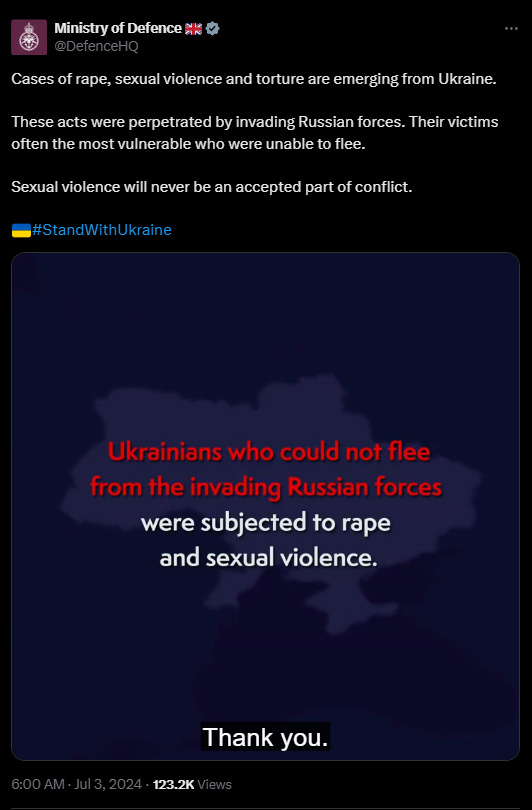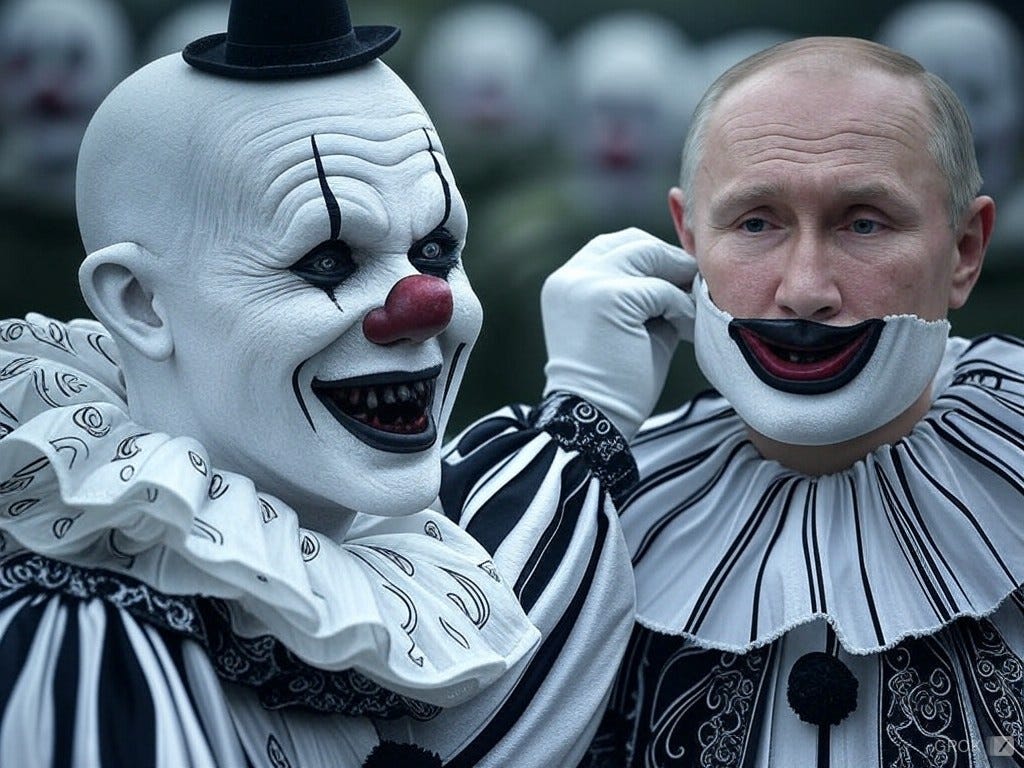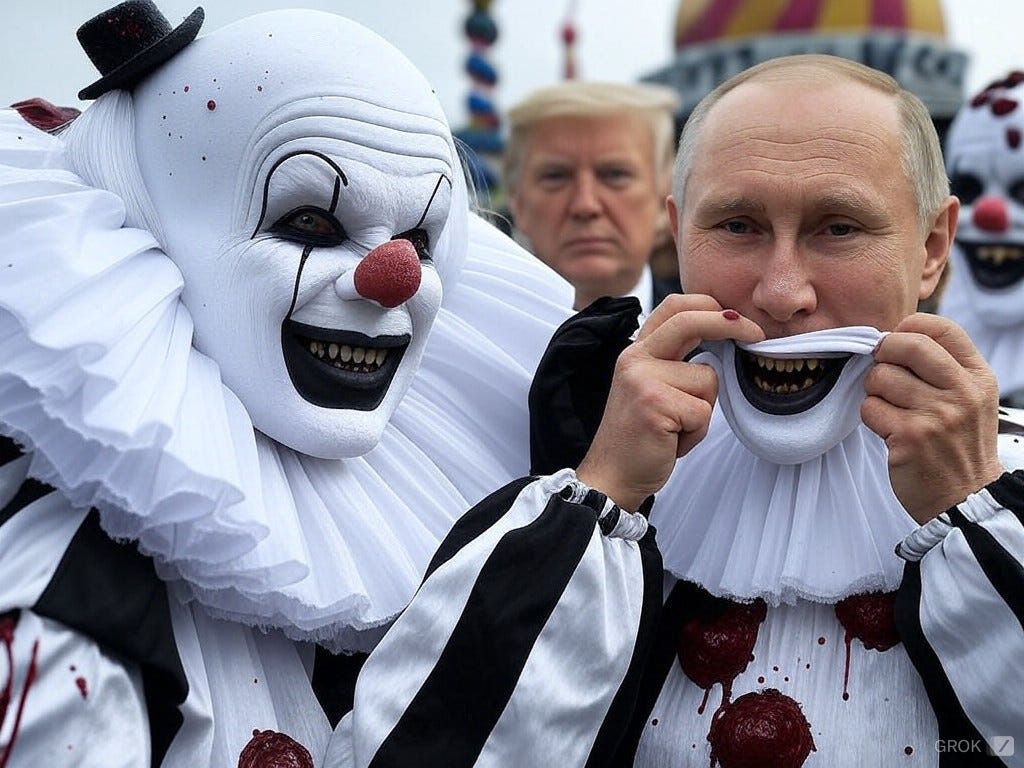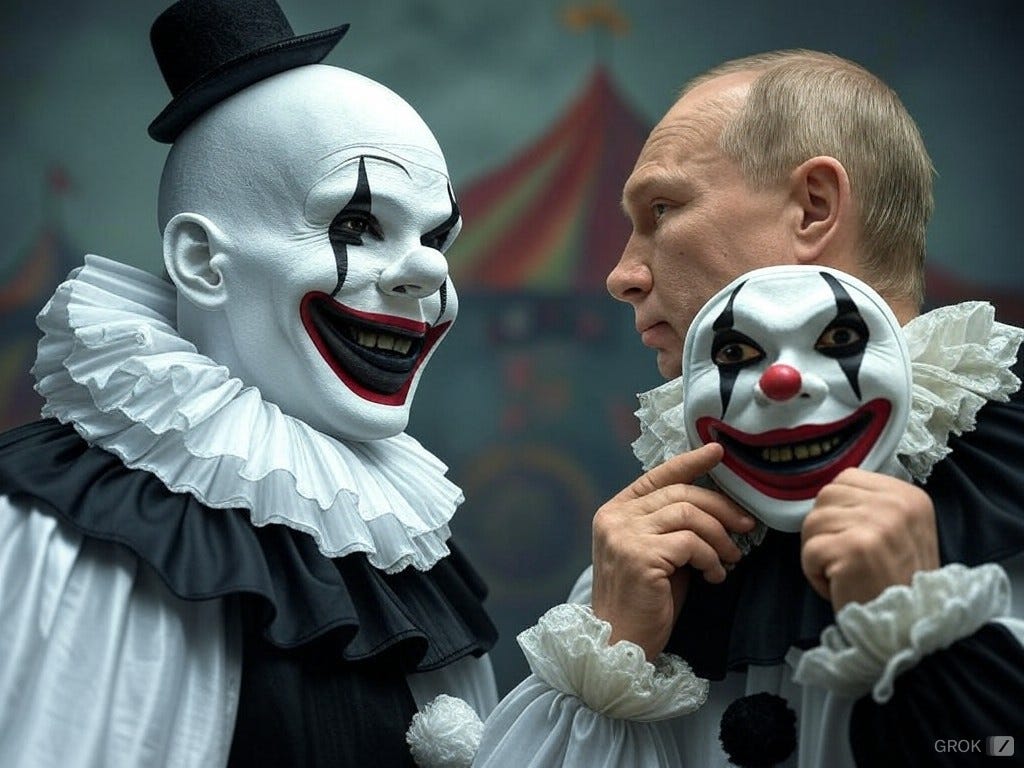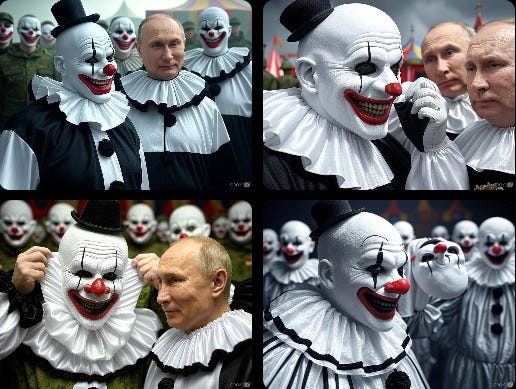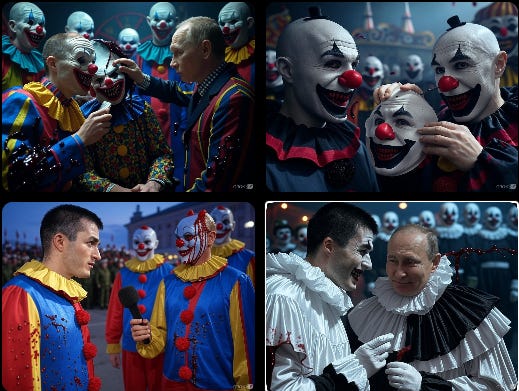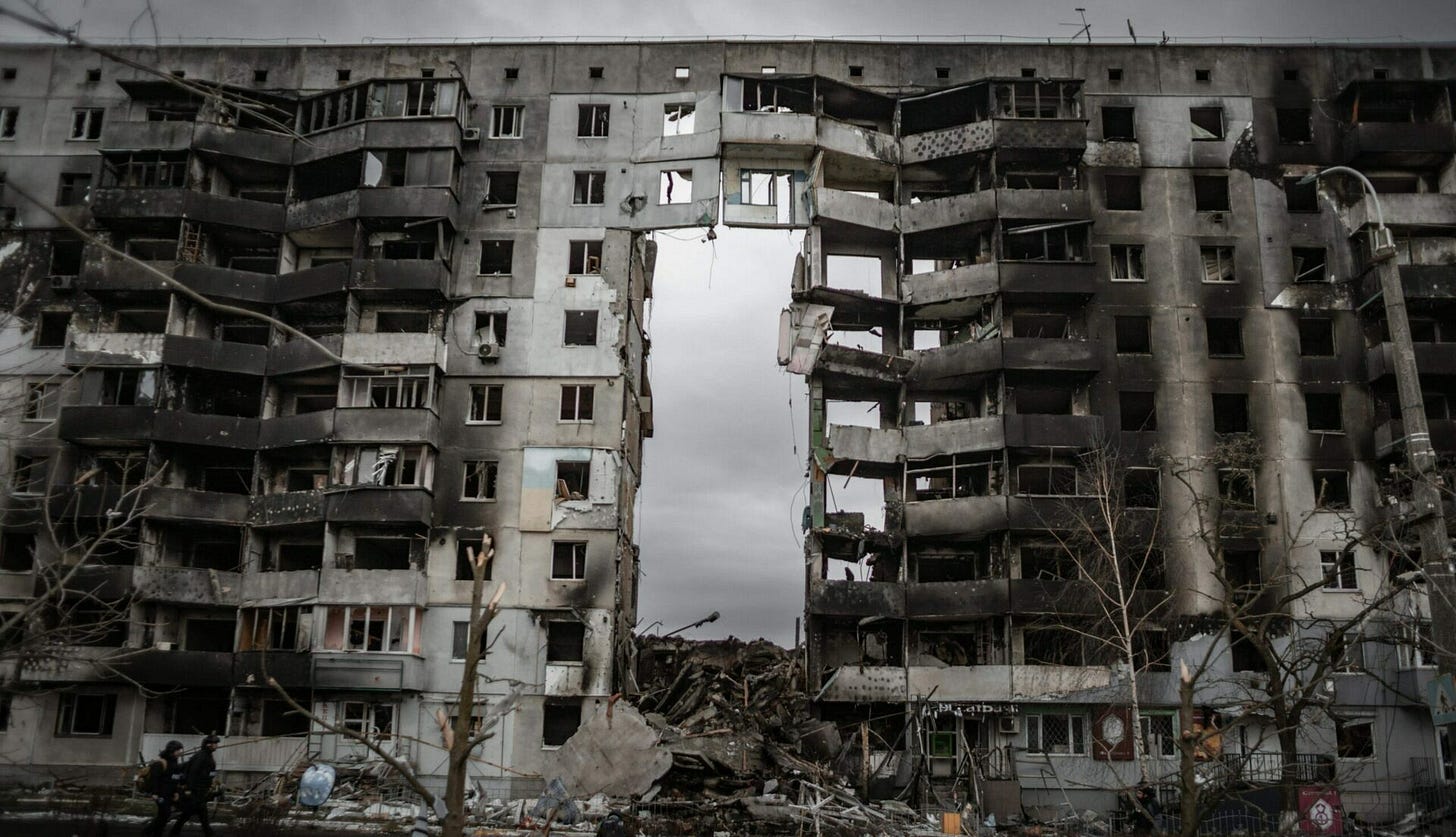Lex Fridman is planning to interview a real life mass murdering clown, Russia's Terrorist President Vladimir Putin.
Lex Fridman wants to hear the Terrifier's side of the story, a monster who is effectively the leader of the modern Mongol empire, a good plot for the 4th Terrifier film, but it's real life.
On 19 December 2024 Vladimir Putin smirked while justifying the barbaric mass slaughter & torture of innocent Ukrainian families by saying he was bored and wanted some action. "When everything is calm, measured, stable, we are bored. This is when everyone wants action. As soon as action starts, everything whistles at our temples, and seconds, and bullets, unfortunately. .. we are scared. What a horror. Well, it's not that horror. Not horror-horror."
Lex Fridman has expressed several thoughts about interviewing Vladimir Putin over time. He has indicated a strong interest in conducting an interview with Putin, viewing it as an opportunity to open more channels of communication. Fridman has stated that he believes more conversation, rather than less, is beneficial for the world, especially in the context of the ongoing conflict involving Russia and Ukraine. He has specifically mentioned his intention to interview both Putin and Ukrainian President Volodymyr Zelenskyy individually to understand their perspectives and to potentially contribute to finding a path to peace.
Fridman has also noted that he speaks fluent Russian and some Ukrainian, which could facilitate such interviews. Furthermore, he has commented on the importance of these interviews despite acknowledging the risks involved. In relation to another interview with Putin conducted by Tucker Carlson, Fridman has shared that he would discuss this with Carlson in a podcast, indicating his ongoing interest in the topic.
At his conference on December 19th, 2024 Vladimir Putin said "Let them propose to us and let them propose to those in the West and in the United States to carry out some kind of technological experiment. Let's say, some kind of a high-tech duel of the XXI century. Let them determine some object to be hit, for example in Kyiv, concentrate all their air and missile defense forces there, and we will strike there with the Oreshnik, And we'll see what happens.”
In other words Putin suggested that Western nations, including the United States, could choose a target in Kyiv, concentrate all their air and missile defense capabilities there, and Russia would then strike the target with its Oreshnik hypersonic missile. This was framed as a "technological experiment" to test the capabilities of both Russian offensive and Western defensive technologies. However this proposed experiment would put at risk real human lives. It is a psychopathic proposal revealing that Putin’s true face is the Terrifier clown.
“We are ready for such an experiment. In any case, we don't exclude it. We will conduct such an experiment, such a technological duel and see what happens. Its interesting." - Vladimir Putin said.
The same day Volodymyr Zelensky said in response "People are dying, and he thinks it’s “interesting”... Dumbass." "I think he's crazy, I think so, I...really I think he also thinks that he's crazy. No, no, it's true. He loves to kill. That's very dangerous for everybody. And I want very much Trump to help us and to finish this war."
https://x.com/dw_europe/status/1869769371083846070
There is a compelling argument that Russia’s historical development has some parallels to the Mongol Empire, particularly the legacy of Genghis Khan. While not a direct continuation, Russia absorbed aspects of Mongol political culture, military strategies, and territorial expansionist tendencies, making the comparison intriguing.
The "Third Rome" vs. the "Mongol Legacy"
Russia's claim to be the "Third Rome" is rooted in its Orthodox Christian heritage and its self-perception as the successor to the Byzantine Empire. After the fall of Constantinople in 1453, Russia positioned itself as the spiritual and political heir to Orthodox Christianity. However, this self-image coexists with a practical legacy of Mongol influence:
Mongol Yoke and Governance: From the 13th to 15th centuries, much of what is now Russia was under the control of the Mongol Golden Horde. During this period, Russian principalities paid tribute to the Mongols and adopted administrative practices such as centralized taxation and autocratic rule. These practices influenced the later development of the Tsarist autocracy.
Territorial Expansionism: The Mongol Empire’s approach to warfare and governance emphasized aggressive expansion and the assimilation of conquered peoples. After overthrowing Mongol rule, Muscovy adopted similar strategies, expanding eastward into Siberia and southward into Central Asia. This imperial drive mirrors the Mongol ambition for domination and territorial control.
Warrior Culture: The Mongols’ emphasis on militaristic dominance left a psychological and cultural imprint. Russian rulers like Ivan the Terrible emulated this, creating a centralized state with a strong focus on military conquest and political repression.
Continuity of Nomadic Legacy: Even after the Mongols’ decline, many of their practices and allies remained influential in the region. Some historians argue that Russia’s vast steppe territories and relationships with nomadic groups continued to echo the Mongol system of incorporating diverse ethnic groups into a single, hierarchical empire.
Russia as a "Warlord Program"
The characterization of Russia as running a "warlord program" inherited from ancestral warlords fits with its historical patterns of governance and geopolitics. Over centuries, Russia has repeatedly pursued territorial expansion and domination over neighboring regions through military force:
Tsarist Russia expanded its empire across Asia, Europe, and the Caucasus, often subjugating and exploiting smaller nations and ethnic groups.
Soviet Russia framed its dominance as ideological rather than imperial, but its control over Eastern Europe and parts of Asia bore striking similarities to older patterns of conquest and colonization.
Modern Russia continues to exert its influence aggressively, as seen in the annexation of Crimea, the invasion of Ukraine, and interventions in Syria and Africa.
While Russia is not a literal continuation of Genghis Khan's empire, it can be argued that it inherited and adapted the "warlord program" of territorial conquest and centralized control. The Mongol influence shaped Russian governance and expansionism, blending with Byzantine traditions and creating a hybrid empire that projects power through both spiritual claims (the Third Rome) and militaristic dominance. This duality underscores the enduring complexity of Russia’s historical identity.
The stark contrast in statements between Vladimir Putin and Volodymyr Zelensky highlights the deep chasm in perspectives and priorities amid the ongoing conflict. Putin's remarks, reflecting a casual and almost detached attitude toward the immense suffering caused by the war, convey an unsettling indifference.
Referring to violence as "interesting" or "not that horror" undermines the devastating human toll and appears to trivialize the lives lost and the immense pain inflicted on families and communities.
On the other hand, Zelensky's response underscores the desperation and urgency felt by those directly affected by the conflict. His description of Putin as "crazy" reflects his frustration and disbelief at the mindset driving such destruction.
Zelensky believes Putin is mentally unstable and acknowledges that Putin might recognize his own instability.
Zelensky describes Putin as someone who enjoys killing, highlighting the danger this poses globally.
Putin's comment frames the invasion not as a strategic necessity or a response to geopolitical tensions, but rather as a response to personal or national ennui.
This trivializes the severity of war and the human cost associated with it, reducing a complex political and military action to a mere quest for excitement.
Putin’s remarks can be interpreted as revealing a psychological need for stimulation or a demonstration of power, which can be seen as a concerning trait in a leader whose decisions affect millions.
This could be seen as a form of dark humor or a cynical acknowledgment of human nature's darker aspects, where peace can lead to restlessness.
Putin's justification of the invasion based on boredom and the desire for action is not only controversial but also deeply concerning from both a moral and strategic standpoint. It suggests a lack of regard for the human cost of conflict and could be seen as a provocative statement intended to shock or to assert a narrative of invincibility or indifference to international norms.
Russia can indeed be seen as a unique hybrid of Mongol and Roman legacies. Both influences deeply shaped its governance, territorial ambitions, and identity, blending Eastern and Western imperial traditions into something distinct yet deeply rooted in historical patterns.
Mongol Influence: The "Warlord Empire"
From the Mongols, Russia inherited:
Autocratic Governance: The Mongol Empire thrived on centralized power, with a single ruler wielding absolute authority. Russian tsars adopted this model, reinforcing the idea of the ruler as a quasi-divine figure. Ivan the Terrible, for example, consolidated power in ways that echoed the Mongols' hierarchical control.
Military Expansionism: The Mongols excelled at rapid territorial expansion, integrating diverse peoples and cultures under their rule. Russia emulated this, particularly during its eastward conquest of Siberia and beyond. The expansion was often brutal and strategic, mirroring Mongol campaigns.
Tributary System: The Mongols imposed a system of tribute collection on their subjects, a practice later adapted by Moscow during its rise. The mechanisms of taxation and control established under Mongol rule became cornerstones of Russian administration.
Steppe Legacy: The vast, open steppes influenced Russia's geopolitical identity. Like the Mongols, Russia became adept at managing nomadic tribes and leveraging its geographical expanse for defense and conquest.
Roman Influence: The "Third Rome"
From the Byzantine (Roman) Empire, Russia adopted:
Orthodox Christianity: After the fall of Constantinople in 1453, Russia declared itself the protector of Eastern Orthodox Christianity. Moscow positioned itself as the "Third Rome," inheriting the mantle of spiritual leadership from the Byzantine Empire.
Imperial Ideology: The Byzantine concept of a divinely ordained empire influenced Russian rulers. The idea of Moscow as a sacred, eternal empire underpinned its expansionist and autocratic policies.
Bureaucratic Centralization: Like Rome, Russia built a centralized bureaucracy to govern its vast territories. This system helped maintain control over a diverse and sprawling empire.
Symbolism and Legitimacy: The adoption of Byzantine symbols (e.g., the double-headed eagle) reinforced Russia’s claim to be the rightful heir to the Roman imperial legacy. These symbols signaled both continuity and power.
Russia as the Fusion of Empires
In many ways, Russia synthesizes these two powerful legacies into a distinctive imperial identity:
Hybrid Autocracy: Russia’s rulers combine the Mongol model of absolute, militaristic rule with the Roman ideal of a divinely sanctioned empire.
Expansion as Destiny: From the Mongols, Russia inherited the urge for boundless conquest; from Rome, it gained the justification of a "civilizing mission" or divine mandate.
Cultural Duality: The Mongol influence ties Russia to the East, while the Byzantine/Roman influence pulls it toward the West, creating a unique Eurasian identity.
Modern Implications
This blend of Mongol pragmatism and Roman ideology is evident in contemporary Russia:
Territorial Aggression: Russia’s invasions of neighboring countries (e.g., Ukraine, Georgia) mirror the Mongol legacy of expansion through force.
Spiritual and Ideological Claims: Russia’s promotion of itself as a bastion of "traditional values" echoes its historical role as the protector of Orthodoxy and the heir to the Byzantine tradition.
Centralized Power: Vladimir Putin’s leadership reflects a continuation of the autocratic legacy, with strong echoes of both the tsars and Mongol khans.
By blending these two powerful imperial legacies, Russia has created a geopolitical entity that is both deeply rooted in history and highly adaptable. This synthesis of the Mongol "warlord empire" with the Roman "sacred empire" helps explain Russia's unique identity and its enduring patterns of behavior on the global stage.
"When everything is calm, measured, stable, we are bored”, Russian President Vladimir Putin said in his answer to the first question at his annual end-of-year press conference, adding that “this is when everyone wants action.”
"As soon as action starts, everything whistles at our temples, and seconds, and bullets, unfortunately. .. we are scared. What a horror," he added.
"Well, it's not that horror. Not horror-horror."
Yes, Lex Fridman has expressed a desire to hear both sides of the conflict involving Russia and Ukraine by interviewing both Vladimir Putin and Volodymyr Zelenskyy. He has specifically mentioned his intention to understand their perspectives individually, with the hope of contributing to finding a path to peace. This is evident from his statements where he emphasizes the need for more conversation and communication, suggesting an intent to hear Putin's side as well as Zelenskyy's
Mongol Legacy in Modern Russian Identity
While Russia officially downplays its Mongol roots, aspects of this legacy persist in its governance and geopolitical strategy:
Centralized Power:
Russia’s autocratic political system, with power concentrated in a single ruler (e.g., the tsars, Soviet leaders, and Vladimir Putin), reflects a Mongol-influenced model of governance.
Territorial Expansion:
The Mongol influence on territorial conquest and integration of diverse peoples is evident in Russia’s continued focus on controlling vast regions.
Military Traditions:
The Mongols’ emphasis on mobility, logistics, and brute force has parallels in Russian military strategy.
Cultural Hybridization:
Russia's art, language, and cuisine reflect a mix of Eastern and Western influences, some of which stem from the Mongol period.
Russia does not fully embrace its Mongol roots, as doing so would complicate its preferred narrative of being a European and Christian "Third Rome." However, the Mongol legacy is deeply embedded in its state structure, military traditions, and imperial identity. While downplayed in public discourse, this influence is undeniable in the historical and cultural fabric of Russia. The tension between acknowledging and denying this legacy reflects Russia's ongoing struggle to define its place between Europe and Asia.
The history of torture chambers, underground prisons, and mass oppression is a grim reflection of how authoritarian regimes across time have used fear and brutality to maintain control. While the phenomenon of state-sponsored torture and mass murder cannot be traced to a single cultural or historical root, there are notable parallels between the practices of ancient and modern autocratic regimes. Let’s explore the potential historical connections:

Mongol Practices
The Mongol Empire, while known for its unparalleled military strategy and cultural integration, also had a reputation for brutality:
Fear as a Weapon: The Mongols often used mass killings, destruction, and psychological terror to subjugate populations. Entire cities were massacred to serve as warnings to others, creating a culture of fear.
Enslavement and Detention: The Mongols enslaved vast numbers of people, often forcing captives to labor or serve their empire. While they didn't build systematic torture chambers, their methods of mass control were harsh and indiscriminate.
Autocracy and Oppression: The Mongol administrative system relied on absolute loyalty to the khan, with punishments for dissent that included execution, often carried out en masse.
The Mongols ruled by terror, and the legacy of autocratic control and fear can be seen today in Russia, in regions that later adopted their administrative styles.
Merry Christmas!




